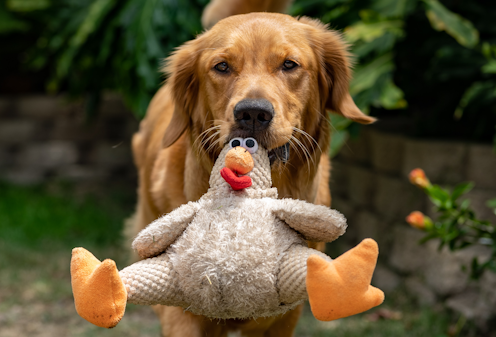Why do our dogs and cats bring us dead animals?
- Written by Mia Cobb, Research Fellow, Animal Welfare Science Centre, The University of Melbourne

What do a little penguin, a baby rabbit, a black rat and a Krefft’s glider[1] have in common? They’ve all been presented to me (when dead) by my animal companions. Chances are, if you live with a cat or dog, you’ve also been brought something similar.
So, is it a gift, are they showing off, or is something else going on?
Is it meant for you?
The first thing to consider is whether your canine or feline companion is actually bringing you the dead animal, or are you just in the space they have also come to?
As people, we tend to like putting ourselves into the middle of every story (the fancy term to describe this mindset is anthropocentric). But sometimes it’s not about us. Maybe your dog was planning to munch away at that half-rotten critter on their comfortable bed in a known safe place, which coincidentally is near where you are.
Read more: Genetic research confirms your dog's breed influences its personality — but so do you[2]
Perhaps your cat has entered the room, truly parading the find in their mouth to you. This might include them loudly exclaiming they hit their version of the jackpot with a direct approach: walking towards you, holding eye contact with you and making a distinctive cry (most cat meows are designed to get your attention[3]).
If this is the case, then yes, they probably are intentionally sharing this dead animal with you. But why?
Understanding animal motivations
Did they kill this animal themselves?
Globally, we know people value wildlife[4] in both urban and rural areas. Yet our companion cats and dogs kill huge numbers of wild animals[5]. In Australia, cats in particular have attracted attention and management policies[6] to reduce their impact on local wildlife[7].
Read more: Australia must control its killer cat problem. A major new report explains how, but doesn't go far enough[9]
Are they bringing you something that was already dead?
In some situations, our animals may just be opportunistic and have found something that was already dead. Perhaps it was dropped in a paddock by an owl, or washed up on the beach, or hit by a vehicle and found on the side of a road. What are we to make of these offerings?
In 2015, Queensland biologists described a number of individual wild bottlenose dolphins apparently “gift-giving” wild-caught fish (usually already dead) or cephalopods (such as squid and octopus) to the people who fed them fish as part of a regulated feeding program at Tangalooma in Australia.
The researchers thought the gifting was consistent with play, prey-sharing and teaching behaviours observed in dolphins, whales and many other mammals historically considered as big thinkers.
Ultimately, with these dolphins, and with our own animal companions, we can think of this sharing as an expression of the particular relationship between the animal and the human. In some cases, where the behaviour is regular (even if infrequent), we can describe it as part of the animals’ culture, as the dolphin biologists did in their scientific paper[10].
Read more: Whales and dolphins have rich cultures – and could hold clues to what makes humans so advanced[11]
What should you do?
If you ever find yourself in the position where your animal companions bring you a dead animal, there are a couple of things to remember.
Regular parasite control will ensure you don’t all share more than intended. Mites responsible for mange, lice and worms can all spread readily between dead wildlife, animal companions and people. Talk to your veterinarian if you’re unsure about what parasite control your four-legged friend should routinely have.
Stopping cats and dogs from preying on wildlife is a really important part of looking out for everyone’s wellbeing. If you know your animal companion is killing wild animals, you should take action to prevent it.
Effective measures might include safely limiting when and where they go outdoors, a bell on their collar, keeping them on a lead when outside, and redirecting their energy through regular walks[14], play and fun training activities[15]. Keeping cats inside the home can also limit the spread of diseases[16] to humans and other animals.
Read more: Cats that are allowed to roam can spread diseases to humans and wildlife[17]
So, when your cat or dog presents you with a dead animal, it is normal behaviour and can indicate their attachment to you. It’s also a reminder, though, of how much damage they can do to wildlife and of our responsibility to limit that harm.
References
- ^ Krefft’s glider (theconversation.com)
- ^ Genetic research confirms your dog's breed influences its personality — but so do you (theconversation.com)
- ^ designed to get your attention (www.ncbi.nlm.nih.gov)
- ^ people value wildlife (journals.plos.org)
- ^ kill huge numbers of wild animals (theconversation.com)
- ^ attention and management policies (www.publish.csiro.au)
- ^ reduce their impact on local wildlife (theconversation.com)
- ^ CC BY (creativecommons.org)
- ^ Australia must control its killer cat problem. A major new report explains how, but doesn't go far enough (theconversation.com)
- ^ in their scientific paper (doi.org)
- ^ Whales and dolphins have rich cultures – and could hold clues to what makes humans so advanced (theconversation.com)
- ^ S. Newrick/Wikimedia Commons (commons.wikimedia.org)
- ^ CC BY-SA (creativecommons.org)
- ^ through regular walks (theconversation.com)
- ^ training activities (theconversation.com)
- ^ limit the spread of diseases (theconversation.com)
- ^ Cats that are allowed to roam can spread diseases to humans and wildlife (theconversation.com)
Read more https://theconversation.com/why-do-our-dogs-and-cats-bring-us-dead-animals-189983

















